Love it or hate it, matcha is a huge part of a new superfood craze. We’ve all heard the rhetoric for why you should drink more matcha: it relieves anxiety! It’s full of nutrients! It helps you lose weight!
But matcha is expensive - and let’s be honest, it doesn’t taste great unless you add a load of sugar and flavorings, which sort of defeats the point of being healthy. Luckily, there are plenty of yummy teas that can give you the same or even greater benefits than matcha for less money.
Today, I’m going to cover the best matcha powder alternatives for:
- Relaxation
- Weight loss
- Cooking, nutrients, and ceremony
… including what to drink if you want something as much like matcha as possible! Along the way, I’ll also provide antioxidant, caffeine, and price comparisons for each option.
If you want to learn about the best matcha substitutes for focus, a caffeine hit, and antioxidants, check out Part One of this post here!
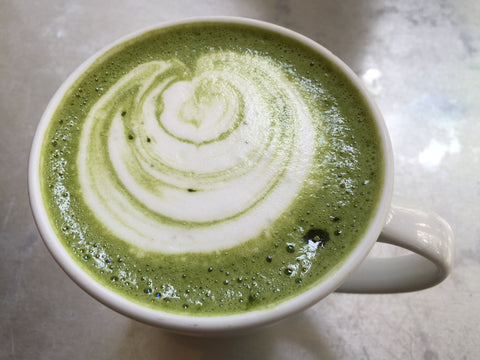
Notes before we begin:
- ORAC stands for Oxygen Radical Absorbance Capacity and is a scale to gauge antioxidant units. The higher the ORAC value, the higher the antioxidant level. For more info about ORAC values, check out our post about why you should be paying attention to those numbers!
- The figures for caffeine, prices, and antioxidants are approximate - of course, these numbers can vary between different methods in processing, tea estates and terroirs, and manufacturers.
Best Matcha Alternatives for Relaxation: Rooibos and Chamomile
If you’re looking to kick back and relax, matcha might actually be working against you, due to its caffeine content. But you know which teas have properties that help you relax and don’t contain any caffeine? That’s right - rooibos and chamomile!
|
Rooibos |
Chamomile |
Matcha |
Difference |
|
|
Antioxidants (ORAC) |
1537.6 / 8oz mug |
1000 / 8oz mug |
1384 / 8oz mug |
11% More ✔ (Rooibos) 28% Less ✘ (Chamomile) |
|
Price |
$0.36 / 8oz mug |
$0.43 / 8oz mug |
$1.03 / 8oz mug** |
65% Less ✔ (Rooibos) 58% Less ✔ (Chamomile) |
|
Caffeine* |
0 mg / 8oz mug |
0 mg / 8oz mug |
~70 mg / 8oz mug |
100% Less ✔ - naturally decaf |
*A cup of black coffee has ~95 mg of caffeine for comparison
**See our research in our The Dark Truth About Matcha post. Note this matcha price does not include shipping, whereas our rooibos and chamomile average prices do, so in fact it’s even cheaper!
About Rooibos
Rooibos tea is naturally caffeine-free, super high in antioxidants, has antihistamine qualities, and helps reduce stress. It is grown only in a 3,000-square-mile area in South Africa, and has been cultivated commercially since the 1930s.
Rooibos has a rich, woody taste that goes beautifully with many other flavors. It can’t be over-steeped, which means it’s no biggie if you accidentally leave it brewing for too long - you’ll still end up with a great flavor and no bitterness!
To learn more about the benefits of rooibos and other fun facts, check out our post comparing honeybush and rooibos teas!
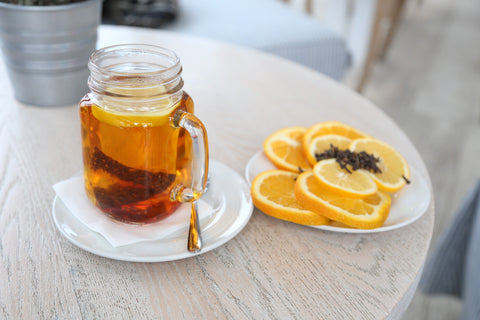
Why Rooibos is a Great Matcha Alternative for Relaxation
Is matcha good for anxiety and stress? Sure - matcha does contain chemicals that can help relax you. However, the ideal relaxation tea should be caffeine-free, since caffeine can mess with your sleep schedule, worsen anxiety, cause irritability, and induce heart palpitations. (1) Unfortunately, matcha has caffeine levels approaching that of coffee.
By contrast, rooibos contains no caffeine whatsoever, and its relaxing properties can help improve sleep and reduce stress! Rooibos also has more antioxidants than matcha in terms of ORAC. Basically, it’s one of the best teas for anxiety out there.
Fancy a try? Shop our rooibos collection!
About Chamomile
Chamomile actually comes in many different varieties, but only two are used for tea: German and Roman chamomile. It’s grown all over the world, but the best strains are cultivated in Egypt (here at Matcha Alternatives, we only sell German chamomile grown in Egypt … yeah, the name is a little confusing!).
The medicinal use of chamomile can be traced back thousands of years to ancient Egypt, Greece, and Rome. It’s known to be anti-inflammatory, antiseptic, antimicrobial, and it has properties that help relieve muscle spasms, flatulence, and mucus congestion.
Naturally caffeine-free, chamomile has a mellow, floral flavor, and tastes lovely on its own or with a dash of honey.
To get more info about chamomile and its multitude of health benefits, check out our chamomile spotlight post!
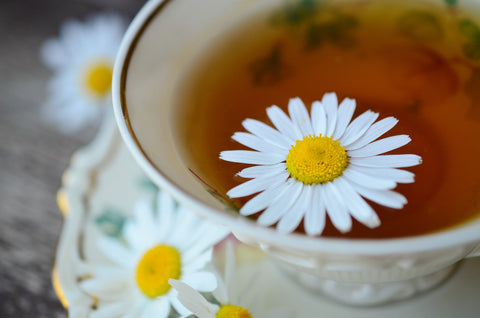
Why Chamomile is a Great Matcha Alternative for Relaxation
Chamomile is widely known as the king of relaxation teas. It helps reduce stress, aid digestion, reduce muscle and menstrual pain, and boost your immune system! These properties make it ideal for helping you take a load off.
The one drawback of chamomile is that it doesn’t have as many antioxidants as other teas, so you may want to make sure you also drink teas that have high levels of those. Incidentally, there are teas that have way more antioxidants than matcha - read part one of this post to find out what they are.
Fancy a try? Shop our chamomile collection!
Best Matcha Alternative for Weight Loss: Green Tea
Matcha is often touted as a weight loss miracle. But while lots of people, including me, love matcha in a frappe or dessert, not many people want to drink it straight - and of course, matcha won’t be helpful for weight loss if you’re consuming it in a sugary treat.
Luckily, there’s a "related" drink that tastes way better and has been shown to help with weight loss: of course it's green tea!
|
Green Tea |
Matcha |
Difference |
|
|
Antioxidants (ORAC) |
1253 |
1384 |
7.3% Less ✘ (similar) |
|
Price |
$0.39 / 8oz mug |
$1.03 / 8oz mug** |
62% Less ✔ |
|
Caffeine* |
~30 mg / fluid oz |
~70 mg / fluid oz |
57% Less ✔ |
*A cup of black coffee has ~95 mg of caffeine for comparison
**See our research in our The Dark Truth About Matcha post. Note this matcha price does not include shipping, whereas our rooibos and chamomile average prices do, so in fact it’s even cheaper!
About Green Tea
Green tea hails from Japan and China, and is considered the oldest tea in the world, having been in use for over 4,000 years. Like black, oolong, and pu-erh teas, it’s made from the Camellia sinensis plant; unlike those teas, it’s unoxidized, meaning it contains more antioxidants than the aforementioned teas.
Japanese green teas are more standardized in flavor than their Chinese counterparts; you can be pretty certain of what that cup of Japanese green tea will taste like based on its name and grade. Japanese green teas are steamed, and many grades are grown in the shade, which yields a higher chlorophyll content and makes the tea brighter green in appearance.
Chinese teas tend to be pan-fried instead, and because Chinese teas are lower in chlorophyll, they tend to create an infusion with golden tones.
Green tea has a variety of flavors depending on the strain, with tastes ranging from salty to smooth to sweet. It blends well with added flavorings, flowers and fruits, meaning the world of green tea is endless!
To learn more about the wonderful world of green tea, check out our Green Tea Introduction blog post!
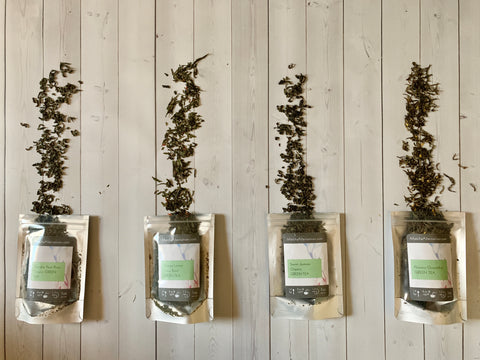
Why Green Tea is a Great Matcha Alternative for Weight Loss
Like matcha, green tea has been associated with weight loss, thanks to its high catechin content and in particularly EGCG, plus a modest dose of caffeine. Research suggests that this combination may help speed up your metabolism, and thus burn calories more efficiently. (2) In fact, it’s even been suggested that drinking green tea before a workout can help you burn more fat (3).
Studies have also indicated that drinking a caffeinated beverage before a workout can help you exercise more effectively, especially if you’re a serious athlete. (4) Yes, plenty of drinks contain caffeine; matcha included. The problem is that some people, including me, can be sensitive to caffeine and matcha has a LOT of caffeine.
I remember when I went to swim practice once after downing a high-caffeine cup of tea, and I was so jittery I could barely focus on the workout (apologies to my poor coach)!
That’s no way to get fit! My mind and body should have been focused on the job at hand, instead of being so buzzed up that I found myself standing in the pool thinking of what I should have said to that annoying person in the checkout line yesterday.
Since drinking matcha means you’re consuming the actual tea leaf, it’s way higher in caffeine than green tea. Thus, green tea may be more effective than matcha for helping you reach your workout goals if you’re sensitive to caffeine. Not to mention, of course, that it's way cheaper and a lot of people think it tastes nicer!
In short, the answer to whether you should drink matcha or green tea for weight loss is that it depends on your goals, your body and the time of day. Undoubtedly, matcha is a great fitness drink, and it contains more ECGC than green tea because it involves consuming the whole leaf (making it the better option in terms of effectiveness on its own).
However, for 1) the caffeine sensitive, 2) an evening work out 3) if you don't like the taste of plain matcha and 4) if you want something much better value but still with the right antioxidants, then green tea is your best bet. You can also drink green tea all day without breaking the bank.
Finally, so you know you're making the right decision either way, be sure to check our our fully referenced blog Busting the Matcha Myth: Does matcha really have 137 times more antioxidants (EGCG) than green tea? Short answer: No. Any matcha shop is trying to dupe when they say this (or least have misinterpreted the science behind it)!
Fancy a try? Shop our green tea collection!
Best Matcha Alternative for Cooking, Nutrients & Ceremony: Moringa
Rooibos, chamomile, and green tea are all very well and good for their respective purposes, but sometimes you need a tea that comes in green powder form - whether it’s because you want to whisk it into hot water like in a tea ceremony, use it to add flavor to a savory dish, or turn it into a delicious Instagrammable dessert.Luckily, you’re not just confined to matcha for these needs! Moringa tea powder looks the same as matcha, has a similar taste and smell (though it’s not bitter like matcha), and you can substitute it for matcha in any recipe.
|
Moringa |
Matcha |
Difference |
|
|
Antioxidants (ORAC) |
1575 / 8oz mug |
1384 / 8oz mug |
13% More ✔ |
|
Price |
$0.43 / 8oz mug |
$1.03 / 8oz mug** |
58% Less ✔ |
|
Caffeine* |
0 mg / 8oz mug |
~70 mg / 8oz mug |
100% Less ✔ - naturally decaf |
*A cup of black coffee has ~95 mg of caffeine for comparison
**See our research in our The Dark Truth About Matcha post. Note this matcha price does not include shipping, whereas our rooibos and chamomile average prices do, so in fact it’s even cheaper!
About Moringa
Moringa powder is made from the leaves of the Moringa oleifera tree, which is native to India. Moringa oleifera also known as the “miracle tree,” and the ancient Indian medicinal practice of Ayurveda lists moringa as a cure for over 300 ailments.
Moringa leaves contain vital antioxidants, nutrients, antibiotic constituents, anti-inflammatory nutrients, and healthy fatty acids (Omega-3s and 6s). Moringa also contains more fiber, vitamins A & C, and protein than matcha, which barely contains any protein to speak of.
Moringa has a grassy, earthy taste with sweet undertones, and lacks the bitterness associated with matcha.
To learn more about moringa and how it compares to matcha, check out our moringa spotlight post!
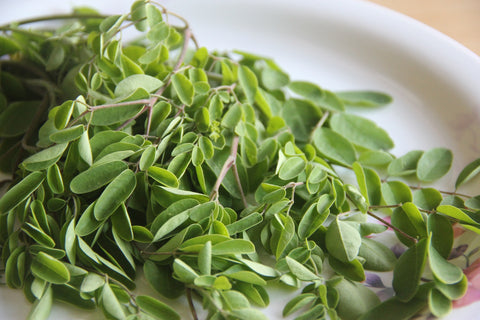
Why Moringa is a Great Matcha Alternative for Cooking, Nutrients & Ceremony
In terms of nutrients, moringa is usually considered to be even more beneficial than matcha. It’s so high in protein and vitamins that it has actually been used to treat malnutrition!
Unlike matcha, moringa is a complete plant protein, which means it contains all the essential amino acids that your body needs to function properly. Only a very few plant-based foods are actually complete proteins, which means moringa is especially useful for vegans!
Many people take moringa as a health supplement, and it’s easy to incorporate this “miracle tree” into your life - you can put it in a smoothie, bake with it, or even put it in cereal (like the founders of Matcha Alternatives do).
If you love matcha, you’ll probably love moringa too - it’s the most accurate matcha powder alternative out there! Aside from looking pretty darn similar, moringa powder has that yummy vegetal taste we all love, but without the bitterness that makes a lot of us shy away from drinking straight-up matcha. Not to mention it’s less than half the price of matcha (I’m a college student - I like my sweet deals)!
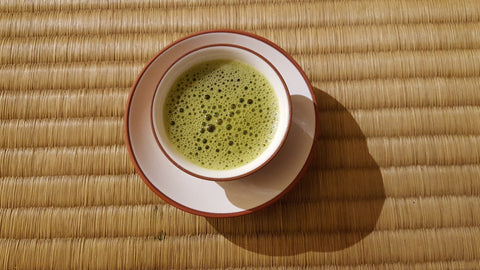
Making matcha the traditional way, with a chawan and a whisk, is something you just can’t do with regular loose leaf tea, but moringa tea powder can easily rise to the challenge.
As mentioned above, you can also substitute moringa for matcha in any dish - check out our favorite moringa-based recipe for chicken and dumpling stew, and our recipe for a dalgona whipped moringa latte!
When I first smelled moringa powder, I could seriously swear it was matcha! After I tasted it, though, I realized that I liked it way better than the bitter stuff I used to choke my way through.
That’s just me, of course - if you’re a die-hard matcha fan, I’m not telling you to give up matcha. What I am telling you is that moringa makes a great matcha-like addition to your kitchen shelf if you want even more antioxidants, vitamins and amino acids (as an aside, moringa can be stored for months without refrigeration and still keep all of its nutrients).
I could write a whole post directly comparing matcha and moringa, but I don’t have to, because we’ve already done that! Click here to read.
Fancy a try? Shop our Superior Organic Moringa Tea Powder!
A Note from Lauren
I like matcha products as much as the next gal: matcha-flavored ice cream mochi is my fave! ....but I have to admit that I’m too much of a wuss to drink it plain because I find it way too bitter. It makes me so relieved that I can get similar or even better health benefits from teas that I actually find yummy! Remember to check out Part 1 of this post for even more alternatives to matcha.
Learn more about Matcha and its rich history here, and why we are called MatchaAlternatives.com here
Here are some of my personal favorite teas at Matcha Alternatives that taste great and give you the benefits of matcha:
|
One of the best I've ever tasted As someone who grew up in the UK, I love my earl grey! Rooibos makes a delicious complement to the bergamot, and not only is it super relaxing, it’s also cheaper and packed with more antioxidants than matcha |
Getting fit never tasted this good! I was in love with this Chinese green tea blend from the first sip! It’s bursting with floral tones, and if you want it even more flowery, you can add a dash of honey. |
Superior Organic Moringa Tea Powder Even healthier than matcha And the most accurate alternative out there! It tastes great by itself, or as a substitute in any matcha-based recipe you can think of |
|
~ Read more: Antioxidants in Rooibos, Honeybush & Chamomile: What Do They Do? |
~ Read more: Best Substitutes for Matcha Tea...for Concentration, Caffeine & Antioxidants |
~ Read more: |
| Explore our Tea Science & Lifestyle blog | | | Subscribe to the MA Blog to save 15%! |
BONUS: FeelGood Music with Every Order!

Disclaimer
All of the information regarding the herbs, botanicals, minerals, vitamins, etc., is information drawn from traditional use data or academic research and should be regarded as such. If you, the reader, has a health or medical concern, please consult your healthcare professional. The information found here is not meant to diagnose, treat, prescribe or cure and has not been evaluated by the FDA. This information is for educational purposes only.
References for the Best Matcha Tea Substitutes for Relaxation, Cooking & Weight Loss
- Pietrangelo, Ann, and Kristeen Cherney. “The Effects of Caffeine on Your Body.” Healthline, Sept. 28, 2018. https://www.healthline.com/health/caffeine-effects-on-body#1
- Kandola, Aaron. “Does green tea help weight loss?” Medical News Today, Jan. 8, 2018. https://www.medicalnewstoday.com/articles/320540#weight-loss
- Gahreman, Daniel, et.al. “Green Tea, Intermittent Sprinting Exercise, and Fat Oxidation.” Nutrients, July 2015. https://www.ncbi.nlm.nih.gov/pmc/articles/PMC4517022/
- Fitzmaurice, Rosie. “The surprising reasons why you should have caffeine before a workout, according to a personal trainer.” Business Insider, Dec. 17, 2017. https://www.businessinsider.com/why-you-should-always-have-caffeine-before-you-work-out-2017-12
+ Matcha Alternatives Resources About the Teas Mentioned Here (all fully referenced)
Moringa: The Complete Vegan Protein
Moringa: The Energizing, Caffeine-Free Matcha Alternative
Moringa vs Matcha – Matcha Alternatives
The Dark Truth About Matcha Tea – Matcha Alternatives
What is Matcha? A Matcha Primer
Japanese and Chinese Green Teas: A Brief Introduction







Good to know that green tea might help with weight loss. It is my favourite tea anyway but boosting my metabolism would be another good reason to like green tea!
Alison Harada
This happy subscriber just read of the weight loss attributes of green tea. Just enjoyed a pot of freshly brewed MA Strawberries & Cream green tea. Delicious!
JANET BIRCH
Your posts are so full of knowledge and they are super useful in the all-things-tea topics. Well done!
Love the resources too, it shows you´ve done your research and it gives us a change to dip deeper.
Patricia Vidal